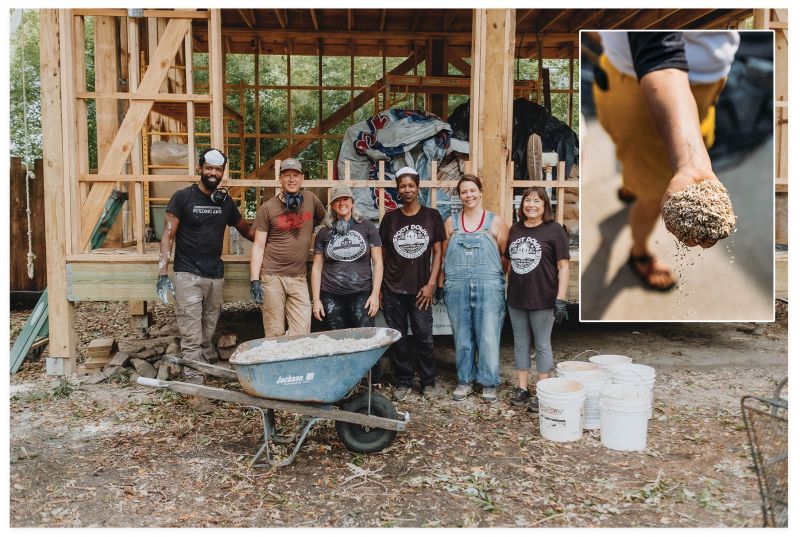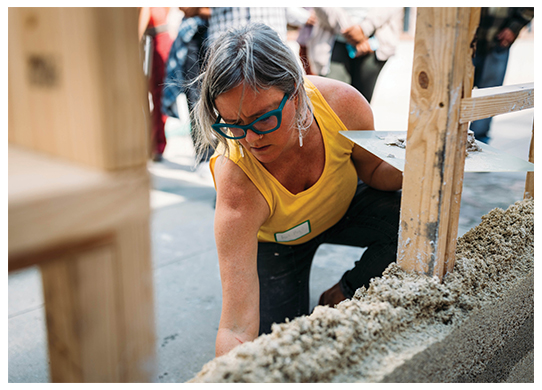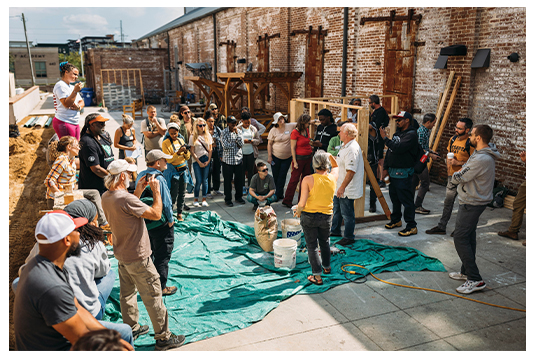Find out about their hempcrete test site and hands-on experiences they offer for people who want to learn more

Root Down Building Collective is testing sustainable building techniques and materials, such as hempcrete (inset), to determine if they can be used effectively on a broader scale in the Lowcountry.
Inside a 350-square-foot outbuilding constructed in April Magill’s James Island backyard, a network of sensors and gauges gathers data on energy performance, moisture movement, humidity control, and indoor air quality. Part studio office, part science experiment, the hempcrete project is the most recent research venture by sustainable housing promoter Root Down Building Collective (RDBC). “We’re going to see exactly how this material performs in the Lowcountry climate,” explains Magill, the architect behind this two-year-old nonprofit. “Our hope is that the building will come out carbon negative or at least carbon neutral.”
Magill, who’s also principal of the Root Down Designs architecture firm, began her deep dive into affordable, sustainable building practices in 2011. “I discovered a whole world of ancient methods and newer materials that get lumped into the category of natural building,” she says. Over the past 15 years, as the public has become more aware of climate change, indoor air quality, and the dangers of red-list materials, Magill’s witnessed local interest steadily grow. And this self-declared idealist wants to make those sustainable materials and techniques accessible to all. “Everybody is entitled to housing, but people don’t want to live in cheaply made, toxic, overpriced homes. We can have equitable housing that’s also sustainable, healthy, and environmentally friendly.”

Executive director April Magill leads workshops to teach architects and building professionals about sustainable materials.
With a three-pillared design supported by research, education, and architectural service, RDBC aims to advance climate-smart and equitable building solutions. From mushroom bricks to rammed earth walls, today’s low-impact innovations involve modern takes on earth-friendly resources. Hempcrete, a plant-based insulation, has been shown to be fire- and mold-resistant, breathable, and quite effective, reducing utility demands by up to 70 percent. “These ideas aren’t just for a bunch of hippies,” says Magill, who also serves as an adjunct professor at the American College of the Building Arts. RDBC’s workshops draw a diverse range of attendees—contractors and designers, but also homeowners, executives, farmers, and other community members. Through construction projects like Awendaw Green’s clay cob oven and the hempcrete test site, the team offers hands-on experiences for those interested in learning more.
In February, RDBC—in coordination with the Sustainability Institute, the City of North Charleston, and other community groups— received an $11 million Environmental Protection Agency Community Change Grant. The money will fund the weatherization of 50 homes and the construction of affordable housing in the Union Heights neighborhood using carbon-negative building materials. “We’re trying to establish a model that we can replicate while developing a workforce fluent in this type of construction,” Magill explains.

Thanks to a volunteer base of licensed architects and engineers, RDBC works to preserve historic neighborhoods, whose residents might otherwise be displaced by developers. “There are people living with holes in the roof because they can’t afford a repair permit and residents getting penalized by livability courts because upkeep on the peninsula costs too much. My hope is that RDBC finds the funding to become an advocate for residents needing to navigate this complex and expensive process.” Magill’s goal is to hire staff to work with financially challenged clients who require architectural services and help navigating bureaucracy.
With visions of an education van and retrofitting workshops, the founder hopes the grant opens the door for expansion. “I believe when we invest in our community and the folks who are living at the lowest financial demographic, we’re going to be stronger altogether.”
WATCH:Root Down Hempcrete Building Workshop - Fall 2022